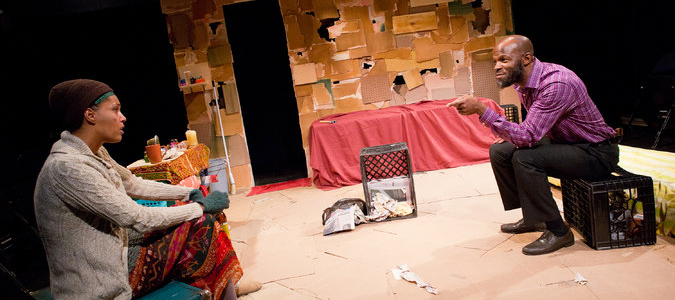

Ndebele Funeral
Opening Night: September 16, 2014
Closing: October 5, 2014
Theater: 59E59 Theaters
Winner of the Overall Excellence Award for Best Play and a Time Out Critic’s Pick at Fringe NYC 2013, Ndebele Funeral pulls audiences into the music, art, and dreams of South Africa’s past and its present. Heart breaking and hilarious, Smoke & Mirrors Collaborative’s powerfully physical production is unforgettable.
BUY TICKETSREAD THE REVIEWS:
September 16, 2014
In drama, as in poetry, I’m all in favor of compression; the more economically one can express one’s ideas, the better. But one can go too far, which is the problem afflicting Ndebele Funeral. In writing a classic state-of-the-nation play, Zoey Martinson tries to lay bare the many disappointments afflicting South Africa in the post-apartheid era — in 80 minutes, complete with interludes of song and dance. It’s a tall order and it results in a drama that is sometimes deeply affecting but oftentimes forced and artificial. The action unfolds in a shack in Soweto Township inhabited by Daweti, once a young woman of promise — she studied law — and now a recluse suffering from AIDS. Having been given building materials as part of a government housing program for the poor, she has instead constructed a coffin in which she likes to sleep. She figures it will become her full-time home soon enough. (She has given up on any kind of medical treatment, for reasons that are never really explained.) Based on the extensive collection of beer cans and bottles tucked away, it would appear that she is planning on drinking herself into a stupor until the end finally comes.
READ THE REVIEWSeptember 16, 2014
“Human beings are born inherently good, possessing so much light…we must find a way to forgive ourselves because everybody was part of Apartide, even those who suffered from it, and that will help get rid of our personal hate…” – Zoey Martinson, Ndebele Funeral It seems there is a lot of personal hate to get over in Martinson’s Ndebele Funeral, a play that transports us to the tin shack ghettos of Soweto, South Africa. Though the audience is treated to rich and lively sights and sounds of South African song and dance, (a type of storytelling in South Africa called township theatre) it is also given a glimpse of how awkward and confused post-Apartheid South Africa is. When a government gets turned upside down, so does its people.
READ THE REVIEWSeptember 16, 2014
When it premiered at FringeNYC 2013, Zoey Martinson’s Ndebele Funeral was a must-see, winning the Overall Excellence Award for Best Play. The limited nature of the Fringe (and the cozy seating arrangement in Teatro Circulo) ensured that not everyone who wanted to see it got to. Thankfully, this politically hard-hitting and lyrical play is receiving an extended run at 59E59 Theaters. The good news is that it has lost none of its original power and relevance. In fact, the performances of the three-person cast have only deepened over the past year. Daweti (Martinson) is a South-African law-school graduate living in a shack in Soweto Township, on the outskirts of Johannesburg. She has few possessions beyond her broken dreams. Her home is a wreck, with garbage and empty beer bottles strewn across the floor. The one piece of furniture in the house in relatively good shape is a large and ornately decorated wooden box. Daweti is suffering from advanced-stage AIDS and this is the coffin she has built for herself, using materials sent by the ANC government for the purpose of constructing a new home.
READ THE REVIEWSeptember 17, 2014
Daweti (Zoey Martinson), a former university intellectual moldering in a Soweto shack, takes an unusual approach to home décor. She calls the dirt and trash littering her floor essential elements of feng shui, and used some government-supplied wood to build a coffin. “I deserve a good coffin while I’m dying,” she tells her friend Thabo (Yusef Miller). “You deserve a good roof while you’re living,” he urges her. But Daweti, with AIDS but refusing medication, has given up on life. Ms. Martinson’s vigorous and disturbing Ndebele Funeral, at 59E59 Theaters, presents a grim portrait of contemporary South Africa, a place of false hopes and bleak realities. Neither Daweti, once a hotshot debater, nor Thabo, who hoped to become a writer, nor even the clerk from the Department of Housing (Jonathan David Martin), are living lives anything like those they’ve dreamed. Indeed, dreams are the only solace Daweti finds.
READ THE REVIEW




















